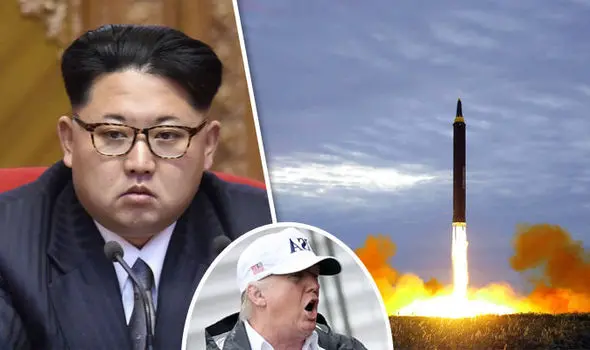By APD Writer Lu Jiafei
Washington, Sept. 15 (APD)-- Three days after the United Nations Security Council unanimously adopted a new resolution to slap fresh sanctions on the Democratic People’s Republic of Korea (DPRK), the pariah state on Friday fired a ballistic missile over northern Japan for the second time in less than a month.
If nothing else, the DPRK’s latest act of defiance should be a wake-up call to the administration of U.S. President Donald Trump who has so far relied solely on tightening sanctions to solve the Korean Peninsula nuclear issue.
Despite its months-long unwise resistance to China’s “double suspension” proposal, the United States should now start to act on the proposal before it is too late.
According to the U.S. Pacific Command, the initial assessment indicated that the DPRK on Friday morning local time fired an intermediate range ballistic missile that “overflew the territory of northern Japan before landing in the Pacific Ocean east of Japan.”
Before the missile launch on Friday, the DPRK had already conducted 14 tests since February, during which as many as 21 missiles were fired.
The country also claimed that it had successfully test-fired two intercontinental ballistic missiles and conducted its sixth and so far the most powerful nuclear test.
With the DPRK making headway with its missile and nuclear programs, UN continued to ratchet up sanctions, which in turn incurred the DPRK’s further provocative action.
For the Trump administration, though top U.S. officials claimed on many occasions that the United States is open to dialogue with the DPRK, the path to such dialogue still remains elusive and the White House becomes obsessed with sanctions alone.
But even if the United States is scrambling to spearhead global efforts to economically pressure the DPRK, decades-long experience has unfortunately taught the DPRK how to evade even the most extensive sanctions regimes, according to a new confidential UN report leaked to the public.
“(A)s the sanctions regime expands, so does the scope of evasion,” said the report by a U.N. panel of experts monitoring enforcement of U.N. sanctions against the DPRK. “Lax enforcement of the sanctions regime coupled with the DPRK’s evolving evasion techniques (is) undermining the goals of the resolutions that the DPRK abandon all WMD (weapons of mass destruction).”
While sanctions alone won’t solve the DPRK nuclear crisis, it is by no means Trump’s “I told you so” moment.
In the past weeks, the bellicose president used dangerously vague langue to flirt with the idea that talks and diplomacy do not suffice.
His bellicosity was again put on full display on Tuesday when he dismissed the new round of UN sanctions as “just another very small step, not a big deal” and ranted that the sanctions paled when compared to “what ultimately will have to happen” to the DPRK.
The thing Trump should bear in mind is that when military conflicts erupt on the Korean Peninsula, millions of people’s lives would immediately be placed in danger.
According to retired U.S. Brigadier General Rob Givens, the estimation is that 20,000 people would die in Seoul, South Korea in the first day of a conflict.
Therefore, diplomatic solutions remain and will continue to remain the only exit out of the conundrum.
However, the diplomatic goal should never be to bring the DPRK to its knee. The effort should be focused on how to bring the isolated country to its reason and on persuading it to halt its nuclear and ballistic missile tests.
While stringent sanctions can contribute to the goal, they have to be paired with a pragmatic strategy of engagement with the DPRK. And with that, the Chinese proposal of “double suspension” could fit in the plan, given the profound lack of trust between the United States and the DPRK.
Foreign Ministry Spokesperson Geng Shuang in the Regular Press Conference
The DPRK has repeatedly claimed that its nuclear program is necessary to deter a U.S. invasion, and the stance cannot be simply dismissed as paranoid since the United States and South Korea till now have chosen to step up its joint military drills even amid intensifying tensions.
With the DPRK suspending its nuclear and missile activities in exchange for the suspension of large-scale U.S.-South Korean military exercises, the essence of the Chinese formula is about making compromise to pave way for possible talks.
While the Chinese proposal cannot guarantee a success, it is potentially the only feasible alternative to the current sanctions regimes already reaching a dead end.
The essence of “double suspension” is all about making necessary compromise to reach a deal of gigantic importance. Failure to achieve that could bring about a catastrophe with doomsday scenario.
Lu Jiafei, fellow of APD Institute. After spending one year in Palestine covering the Israeli-Palestinian conflict between 2013 and 2014, Lu moved to Washington, D.C. and covered the 2016 U.S. presidential election till the very end of Donald Trump’s upset victory. He is a political contributor to APD.
(ASIA PACIFIC DAILY)
 简体中文
简体中文

